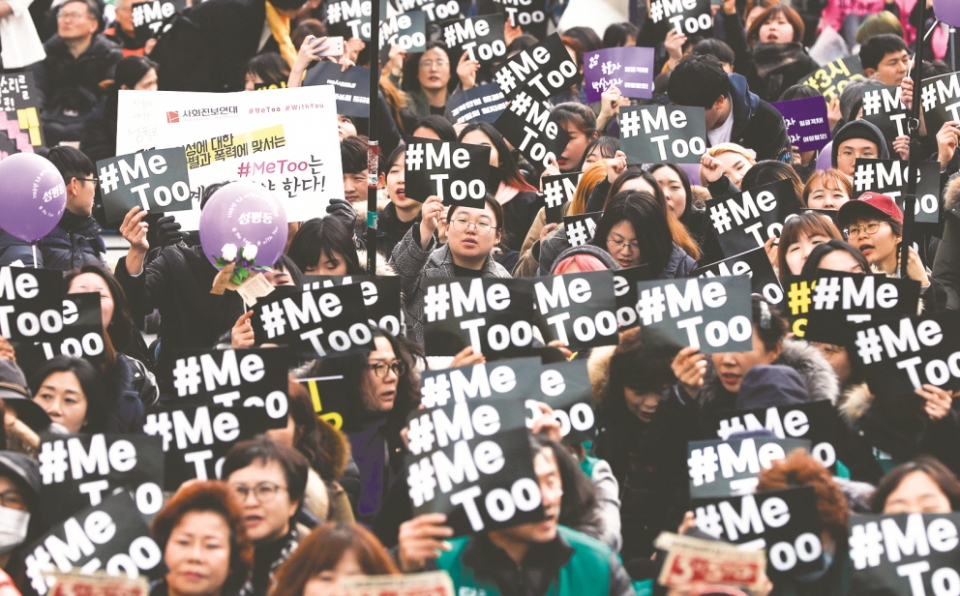
“I survived accidently.” On May 17, 2016, a 23-year-old woman was brutally murdered by a man whom she never met before. The point is that she was killed just because she was ‘FEMALE’. This offence sparked a rallying call against misogyny across the nation. Hundreds of people voluntarily left Post-it condolence notes and white chrysanthemums near Exit 10 of Gangnam Station to mourn the victim’s death. This case is not anything new. It could be seen as a regular event in Korea, where gender inequality and hatred of women is prevalent. Women were afraid to say sexual assault; however, the Gangnam station murder case awoke people’s attention to crime aimed at women.
The silence is broken by a woman’s courageous voice on Jan. 29. Seo Ji-hyeon, a prosecutor, posted her claims on the prosecution’s internal forum, accusing a former prosecutor of sexually molesting her at the funeral of the father of a colleague on Oct. 30, 2010. After her courageous remark, voices of victims began to emerge from the public regarding sexual assault. Society at large has been rocked by the spread of the ‘Me Too’ movement as victims of sexual assault rush forward to speak out against powerful and influential names in the community.
Seo’s disclosure should be seen as a catalyst, not as the start of the ‘Me Too’ movement. Lee Na-young, a professor in Chung-Ang University’s, Department of Sociology, said; first ‘Me Too’ movement is an acknowledgement of Kim Hak-soon, who suffered from Japanese sexual violence during the war. Rather than viewing the ‘Me Too’ movement as a newly initiated movement, she suggested the need to see it through the context of the history of women, who resisted against a discriminatory social structure. Also to consider, there has been a movement in the art world since 2016; as the 2017 winter issue of the Hwanghae Review, a poem titled ‘Goemul’, which was translated to ‘Monster’ illustrates. Poet Choi Young-mi wrote, and later, spoke on Newsroom, JTBC’s daily news program. Choi’s poem begins, “Don’t sit next to En / To me, newly debuted in the literary industry, poet K advised / Whenever En sees a young woman, he touches / Forgot K’s advice and sat next to En / Silk suit top borrowed from my younger sibling got wrinkled.” The poem includes incidents where older writers in the literary world sexually abused younger writers. This issue finally caused these problems to start rising to the surface. Since then, there have been a series of testimonials about sexual violence in the literary world, and in 2018, Seo’s comments have been a trigger that have seen, a renowned politician ,who was a presidential candidate, a poet, a playwright, producers, actors, a theater director, a prosecutor, and a professor accused of sexual assault.
Counter-accusations could be one of the reasons why victims hesitate to accuse a perpetrator. The United Nations Committee for the Elimination of Female Discrimination in Geneva, Switzerland on Feb. 22, 2018 raised concerns that the counter-accusation could make victims silent. In Korea, only 1.9% of people came forth regarding sexual abuse. However, non-prosecution is 26.1%, which is higher than the total non-disclosed average of 25.5%. Victims are denied their rights, such as secondary damages done at work and being sued by defamation. The government has recently announced plans to set up a special reporting center, from March 15 to June 15, in response to the ‘Me Too’ movement and to operate an ombudsman, deployed to specifically deal with sexual assault complaints.
“Speaking is the most powerful tool we all have,” Oprah Gail Winfrey stated at the Golden Globe Awards. Despite these circumstances, the history of women speaking up has continued. The movement of victims of sexual violence speaking out has surged since 2003, and the ‘Me Too’ movement has been a significant part of literary and religious circles since 2016.
“There was no ‘Me too’ movement in Korea, right?” one commentator said. This attitude, knowing how difficult it must have been for them to come up with words, and regarding their suffering as inviolable, are proof of how indifferent it was to the violence and anguish. There has always been a ‘Me too’ movement. We have just been indifferent to it. Please do not disregard tracks of time, agonizing over a few letters that #Me Too contains. The voices of courageous women will continue to be heard.


